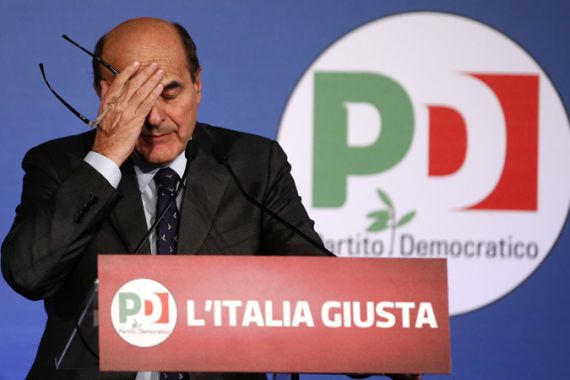Head of Italy’s centre-left alliance to quit
Democratic Party leader Pier Luigi Bersani to resign once new president chosen after party rejects his choice for role.

Voting for an Italian president is set to enter a fifth round as Pier Luigi Bersani, the leader of the Democratic Party (PD) announced he would resign once a new head of state was elected.
Politicians from the main parties said they would either not participate or would cast empty ballots on Saturday in a desperate stalling tactic as they decide what to do next and the centre-left attempts to smooth over widening rifts.
Bersani said on Friday he would resume talks with other parties and would step down once a new president for the country had finally been elected, after his candidate suffered a humiliating defeat.
“He accepted his responsibility after the disgrace of what happened,” Paolo Gentiloni, a senior PD parliamentary deputy said after Bersani’s announcement.
Bersani had backed former premier Romano Prodi, who fell well short of getting enough support in voting on Friday. As voting takes place in secret, deputies are not obliged to toe a party line.
Until the vote, former European Commission chief Prodi had been considered the frontrunner for the job, but the right refused point-blank to support a politician who has twice inflicted election defeats on centre-right leader Silvio Berlusconi.
Leftist voters numbering 101 also opposed him, leaving him with just 395 votes – well short of the 504 needed to win.
Bersani’s selection of Prodi had marked a dramatic about-turn, after he failed on Thursday to impose 80-year-old former Senate speaker Franco Marini on the centre-left as presidential candidate under the terms of a deal with Berlusconi.
The political impasse caused by February’s inconclusive general election has stoked concern about stability in the recession-hit country, the eurozone’s third largest economy.
In comments to the ANSA news agency, Bersani acknowledged that his party alone could not get a candidate voted in.
The political in-fighting has dimmed hopes that the deadlock will be broken any time soon.
Snap election
The disarray in the centre-left, which has the most seats in parliament, could make a snap election in the summer more likely in a bid to end the impasse, but there is no clarity about the next moves after weeks of chaos.
Berlusconi, welcoming the news that Bersani was stepping down, said his party would also abstain from Saturday morning’s vote if the left and the right could not agree on a candidate.
The presidency, an office elected by parliamentarians and regional representatives, is a largely ceremonial position, but is important at times of political instability like the present, when the president plays a major role in forming a government.
Outgoing President Giorgio Napolitano has been unable to find a way out of the crisis with his powers restricted at the end of his mandate.
In the final months of his mandate Napolitano was constitutionally prevented from dissolving parliament and calling fresh elections. The new president is set to have increased powers.
Without a new government, efforts to pull the eurozone’s third-largest economy out of recession and pass meaningful reforms will remain blocked, while rising unemployment and declining living standards feed an increasingly bitter popular mood.